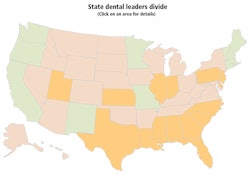
Meeting at the ADA's Chicago headquarters July 18, representatives of the Austin Group and the Boston Group -- two confederations of state dental leaders that have formed over the issue of midlevel dental professionals -- met face to face in an effort to help individual states determine where to go next as the ADA House of Delegates gears up to debate the issue at the ADA annual meeting in October.
The Boston Group has taken an open-minded approach to the question of a new category of dental practitioners, according to group representatives, while the Austin Group is lobbying to uphold the current ADA policy that only dentists should diagnose oral disease, develop treatment plans, or do irreversible procedures.
The ADA convened the meeting to give members of both groups the opportunity to compare notes on the issue.
 |
| Click here to enlarge this image. |
| Click on the image or link to access the interactive map, which shows the alignment of states with each group. |
William Zepp, executive director of the Oregon Dental Association and one of the Boston Group founders, told DrBicuspid.com that the July 18 meeting gave his group a chance to dispel the perception that it's trying to change that policy. "Some folks felt that the Boston states were off trying to create a model," he said. "I think we were able to defuse that a little bit."
Matthew Roberts, D.D.S., a former Texas Dental Association president and a founder of the Austin Group, left the meeting unconvinced. "I personally didn't learn anything new," he said.
At its 2009 meeting, the House of Delegates directed the organization's Council on Dental Practice to research what positions the ADA should take on irreversible procedures and diagnoses by nondentists. The council will submit its report to the Board of Trustees at the board's July 25-27 meeting. But the issue proved so contentious that dissenting council members insisted on submitting their own minority report. Neither report has yet been made public.
ADA leaders are working to bridge the divide. "If we're going to lead this country in dentistry, we're going to have to speak with one voice. One," the council chair, Jerome "Jake" DeSnyder, D.D.S., told the ADA News.
Varying opinions
The formations of the Boston and Austin groups have given different opinions on the midlevel issue a geographical dimension reminiscent of the red-state/blue-state division in U.S. electoral politics. The Boston Group formed two years ago when dental leaders from West Coast and New England states decided to share experiences with legislation to set up various models of new dental practitioner.
Originally, the Boston Group included representatives from California, Connecticut, Maine, Massachusetts, Minnesota, New Hampshire, Oregon, Rhode Island, Vermont, and Washington, but New Mexico and Missouri later sent delegates as well, Zepp said.
By contrast, the Austin Group has attracted representatives from Alabama, Delaware, Florida, Georgia, Illinois, Indiana, Kansas, Louisiana, Mississippi, New Jersey, North Carolina, Pennsylvania, South Carolina, Texas, and Utah.
The Boston Group met three times over two years, taking its name from the city where it held its first meeting. It has not scheduled further activities. "The intention from day one was to be a think tank," Zepp said. "We wanted to look at all the models out there and see how we could influence what was going on. There never was any intention to work up a model or a resolution."
Duties for various classes of hygienist and assistant already range widely from one state to another, and Alaska and Minnesota have set up their own new categories of professional, Zepp noted. "So it's a situation that states face one by one," he said.
The Boston Group participants found they could agree on two broad principles:
- That the dentist has to remain the leader of the dental team
- That the dentist has to have some impact on the training of the other professionals
Lines in the sand
But for some dentists, the notion of nondentists preparing or removing teeth should not even be open for discussion. "I'm almost 100% sure the Austin Group is going to unite around the idea that ADA policy should not change," said Dr. Roberts.
“If your state is not dealing with it today, it will be.”
— William Zepp, Oregon Dental
Association
Current ADA policy states that "the ADA is opposed to nondentists making diagnoses, developing treatment plans, or performing irreversible procedures."
Zepp argued that change is inevitable. On February 1, 2010 -- when state association presidents-elect held a meeting -- proposals for expanding nondentists' scope of practice were afoot in 14 states. By the time of the July 18 meeting, that number had grown to 22, said Zepp, citing ADA statistics.
At the same meeting, according to the ADA, public affairs consultant Charlie Leonard presented the results of his national focus group study on attitudes toward new dental professions. Most people in the focus groups were willing to accept alternative providers for patients who can't afford dentists, although they wanted their own dental care to be provided by dentists, according to the ADA News.
The Kellogg Foundation, the Pew Charitable Trusts, and the Macy's Foundation have also indicated support for midlevel provider pilot programs, the ADA News said.
"If your state is not dealing with it today, it will be," Zepp said. "You should be able to suggest the most appropriate model for your state. I don't see it as necessary to fight against any of the concepts, but to bring dentistry's considerable expertise to the table."
Still, he doesn't hold it against the Austin Group for wanting to fight change. "It's a fact of life for us, but I know there are parts of the country where it's not a fact of life," he said. "If that's your situation, go for it."
Copyright © 2010 DrBicuspid.com



















